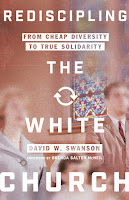It was so great to see many of you at the Discovery Place Resource Center table at Annual Conference! I enjoyed meeting people I have corresponded with regularly and catching up with folks I hadn’t seen in a while. We also appreciated those who stopped by to pick up the books and resources we were giving away on Thursday.
Right after Annual Conference about 40 of us from Susquehanna Conference embarked on a Civil Rights Journey to the deep south, in which we visited sites that were significant in the history of the Civil Rights Movement in America. We gained so much valuable information but also realized that we as a Conference have a long way to go in dismantling racism. As we live into the vision of Building the Beloved Community, I’d like to call your attention to several books and DVD studies that will be helpful to your church. The DVD studies can be borrowed for whatever length of time you need them to complete them. They are:
Vital Conversations: Racism and the U.S. Church – Subtitled “Vital Conversations on Race, Culture, and Justice,” this was published by the General Commission on Religion and Race (GCORR) of the United Methodist Church. Those of you who stopped by our table received a free copy of this DVD and workbook. If you didn’t get one, contact me and we’ll be sure to send you a copy, or you can borrow a copy from Discovery Place.
- White Fragility: Why It’s So Hard for White People to Talk About Racism, by Robin DiAngelo
- White Awake: An Honest Look at What It Means to Be White, by Daniel Hill
- How To Be an Anti-Racist, by Ibram X Kendi
- Pushout: The Criminalization of Black Girls in Schools, by Monique W Morris
- I’m Black. I’m Christian. I’m United Methodist., by Rudy Rasmus and 9 others
- Caste: The Origins of Our Discontents, by Isabel Wilkerson
- Rediscipling the White Church: From Cheap Diversity to True Solidarity, by David W Swanson
- Trouble I’ve Seen: Changing the Way the Church Views Racism, by Drew G I Hart
- Be the Bridge: Pursuing God’s Heart for Racial Reconciliation, by Latasha Morrison
- I’m Still Here: Black Dignity in a World Made for Whiteness, by Austin Channing Brown
- Waste: One Woman’s Fight Against America’s Dirty Secret, by Catherine Coleman Flower











